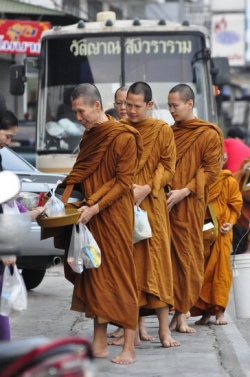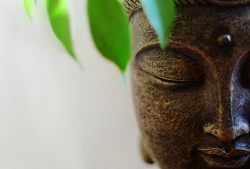Difference between revisions of "King of Samadhi Sutra"
(Created page with "The '''King of Samadhi Sutra''' (Skt. ''Samādhirāja Sūtra''; Wyl. ''ting nge 'dzin gyi rgyal po'i mdo'') aka the '''Moon Lamp Sutra''' (Skt. ''Candrap...") |
|||
| (3 intermediate revisions by the same user not shown) | |||
| Line 1: | Line 1: | ||
| + | {{DisplayImages|678|1426|2502|1724|293|2492}} | ||
The '''[[King of Samadhi Sutra]]''' (Skt. ''[[Samādhirāja Sūtra]]''; [[Wyl.]] ''[[ting nge 'dzin gyi rgyal po'i mdo]]'') aka the '''[[Moon Lamp Sutra]]''' (Skt. ''[[Candrapradīpa]]''; [[Wyl.]] ''[[zla ba sgron me'i mdo]]'') is a famous [[mahayana sutra]] that is frequently cited in [[Madhyamika]] [[treatise]]s, as well as teachings on [[Mahamudra]]. | The '''[[King of Samadhi Sutra]]''' (Skt. ''[[Samādhirāja Sūtra]]''; [[Wyl.]] ''[[ting nge 'dzin gyi rgyal po'i mdo]]'') aka the '''[[Moon Lamp Sutra]]''' (Skt. ''[[Candrapradīpa]]''; [[Wyl.]] ''[[zla ba sgron me'i mdo]]'') is a famous [[mahayana sutra]] that is frequently cited in [[Madhyamika]] [[treatise]]s, as well as teachings on [[Mahamudra]]. | ||
| Line 16: | Line 17: | ||
==Famous [[Quotations: Sutras|Quotations]]== | ==Famous [[Quotations: Sutras|Quotations]]== | ||
| − | {{ | + | |
| − | + | {{tibquote|བདེ་གཤེགས་སྙིང་པོས་འགྲོ་བ་ཡོངས་ལ་ཁྱབ། །<br /> | |
| − | {{: | + | སེམས་ནི་རྒྱ་ཆེན་མཆོག་ཏུ་རབ་བསྐྱེད་དེ། །<br /> |
| − | + | འགྲོ་བ་འདི་དག་མ་ལུས་སངས་རྒྱས་རྒྱུ། །<br /> | |
| − | + | འདི་ན་སྣོད་མིན་སེམས་ཅན་གང་ཡང་མེད། །<br />}} | |
| + | |||
| + | The [[essence]] of the [[sugatas]] pervades all [[beings]].<br /> | ||
| + | Generate the most vast and [[sublime]] of {{Wiki|intentions}},<br /> | ||
| + | For each and every being has the [[cause]] of [[awakening]]—<br /> | ||
| + | There is not a single [[sentient being]] who lacks this potential.<br /> | ||
| + | :::''[[Buddha Shakyamuni|Śākyamuni]]'', [[King of Samadhi Sutra|King of Samādhi Sūtra]] | ||
| + | |||
| + | |||
| + | |||
| + | {{tibquote|གསེར་གྱི་ཁ་དོག་ལྟ་བུའི་སྐུ་ལུས་ཀྱིས། །<br /> | ||
| + | འཇིག་རྟེན་མགོན་པོ་ཀུན་ཏུ་མཛེས་པ་སྟེ། །<br /> | ||
| + | དམིགས་པ་དེ་ལ་གང་གི་སེམས་འཇོག་པ། །<br /> | ||
| + | བྱང་ཆུབ་སེམས་དཔའ་དེ་མཉམ་བཞག་ཅེས་བྱ། །<br />}} | ||
| + | |||
| + | His [[pure]] [[body]] is the {{Wiki|colour}} of {{Wiki|gold}},<br /> | ||
| + | Beautiful is the [[Protector]] of the [[World]].<br /> | ||
| + | Whoever [[visualizes]] him like this,<br /> | ||
| + | Practises the [[meditation]] of the [[bodhisattvas]].<br /> | ||
| + | :::''[[Buddha Shakyamuni|Śākyamuni]]'', [[King of Samadhi Sutra|King of Samādhi Sūtra]] | ||
| + | |||
| + | |||
| + | |||
| + | {{tibquote|ཡོད་དང་མེད་པ་འདི་ཡང་མཐའ་ཡིན་སྟེ། །<br /> | ||
| + | གཙང་དང་མི་གཙང་འདི་ཡང་མཐའ་ཡིན་སྟེ། །<br /> | ||
| + | དེ་ཕྱིར་གཉིས་ཀའི་མཐའ་ནི་རབ་སྤངས་ནས། །<br /> | ||
| + | མཁས་པས་དབུ་ལའང་གནས་པར་ཡོང་མི་བྱེད། །<br />}} | ||
| + | |||
| + | [[Existence]] and [[non-existence]] are [[extremes]],<br /> | ||
| + | [[Purity]] and [[impurity]] are [[extremes]] as well,<br /> | ||
| + | Thus, having relinquished both [[extremes]],<br /> | ||
| + | The [[wise]] do not dwell even in the middle.<br /> | ||
| + | :::''[[Buddha Shakyamuni|Śākyamuni]]'', [[King of Samadhi Sutra|King of Samādhi Sūtra]] | ||
| + | |||
| + | |||
| + | |||
| + | {{tibquote|ཇི་ལྟར་བུ་མོ་གཞོན་ནུའི་རྨི་ལམ་ན། །<br /> | ||
| + | བུ་ཕོ་བྱུང་ཞིང་ཤི་བ་དེ་མཐོང་ན། །<br /> | ||
| + | བྱུང་ནས་དགའ་ཞིང་ཤི་ནས་མི་དགའ་ལྟར། །<br /> | ||
| + | ཆོས་རྣམས་ཐམས་ཅད་དེ་བཞིན་ཤེས་པར་གྱིས། །<br />}} | ||
| + | |||
| + | If, in her [[dream]], a young girl<br /> | ||
| + | Has a baby boy who later [[dies]],<br /> | ||
| + | She [[feels]] [[joy]] at first, then [[grief]]—<br /> | ||
| + | Know all things to be like this. <br /> | ||
| + | :::''[[Buddha Shakyamuni|Śākyamuni]]'', [[King of Samadhi Sutra|King of Samādhi Sūtra]] | ||
| + | |||
| + | |||
| + | |||
| + | {{tibquote|སྒྱུ་མ་བྱེད་པ་དག་གི་གཟུགས་སྤྲུལ་ཏེ། །<br /> | ||
| + | རྟ་དང་གླང་པོ་ཤིང་རྟ་སྣ་ཚོགས་བྱས། །<br /> | ||
| + | དེ་ལ་ཇི་ལྟར་སྣང་བ་གང་ཡང་མེད། །<br /> | ||
| + | ཆོས་རྣམས་ཐམས་ཅད་དེ་བཞིན་ཤེས་པར་གྱིས། །<br />}} | ||
| + | |||
| + | Just as a [[Wikipedia:Magician(paranormal)|magician]] makes [[illusions]]<br /> | ||
| + | Of [[horses]], oxen, carts and other things,<br /> | ||
| + | Nothing whatsoever is as it appears—<br /> | ||
| + | Know all things to be like this.<br /> | ||
| + | :::''[[Buddha Shakyamuni|Śākyamuni]]'', [[King of Samadhi Sutra|King of Samādhi Sūtra]] | ||
| + | |||
| + | |||
==Further Reading== | ==Further Reading== | ||
*[[Khenchen Thrangu Rinpoche]], ''[[King]] of [[Samadhi]]''. [[Rangjung Yeshe Publications]] | *[[Khenchen Thrangu Rinpoche]], ''[[King]] of [[Samadhi]]''. [[Rangjung Yeshe Publications]] | ||
| − | *Skilton, Andrew. ''Samādhirājasūtra'', contained in: Jens Braarvig, Paul Harrison, Jens-Uwe Hartmann, Kazunobu Matsuda, Lore Sander, ed., [[Buddhist]] Manuscripts in the {{Wiki|Schøyen Collection}}, Volume II ({{Wiki|Hermes}} {{Wiki|Academic}} Publishing (Oslo 2002), pp. 97-178. | + | *[[Skilton]], Andrew. ''[[Samādhirājasūtra]]'', contained in: Jens Braarvig, Paul Harrison, Jens-Uwe Hartmann, Kazunobu Matsuda, Lore Sander, ed., [[Buddhist]] Manuscripts in the {{Wiki|Schøyen Collection}}, Volume II ({{Wiki|Hermes}} {{Wiki|Academic}} Publishing (Oslo 2002), pp. 97-178. |
| − | *Skilton, Andrew. 'Dating the [[Samādhirāja Sūtra]] ' in ''{{Wiki|Journal of Indian Philosophy}}'', Volume 27, Number 6, 635-652 | + | *[[Skilton]], Andrew. 'Dating the [[Samādhirāja Sūtra]] ' in ''{{Wiki|Journal of Indian Philosophy}}'', Volume 27, Number 6, 635-652 |
==External Links== | ==External Links== | ||
Latest revision as of 07:16, 23 February 2015
The King of Samadhi Sutra (Skt. Samādhirāja Sūtra; Wyl. ting nge 'dzin gyi rgyal po'i mdo) aka the Moon Lamp Sutra (Skt. Candrapradīpa; Wyl. zla ba sgron me'i mdo) is a famous mahayana sutra that is frequently cited in Madhyamika treatises, as well as teachings on Mahamudra.
Tibetan Texts
- This sutra can be found in the Kangyur (Derge edition), Volume 55, folios 1r. to 170v., where the full Tibetan title is: (Wyl.) 'phags pa chos thams cad kyi rang bzhin mnyam pa nyid rnam par spros pa ting nge 'dzin gyi rgyal po zhes bya ba theg pa chen po'i mdo/
Sanskrit title: arya-sarvadharmasvbhavasamatavipancitasamadhirja-namamahayanasutra
The translators from Sanskrit to Tibetan were: (Wyl.) rgya gar gyi mkhan po shI len dra bo d+hi dang / zhu chen gyi lo tsA ba ban+de d+harma tA shI la
Translations
- 'The Sūtra of the King of Samādhis: Chapters I-IV' in Luis O. Gómez and Jonathan A. Silk (ed.s), Studies in the Literature of the Great Vehicle: Three Mahāyāna Buddhist Texts
- Konstanty Régamey, Philosophy in the Samādhirājasūtra, Motilal Banarsidass (Delhi 1990), reprint of 1938 Warsaw edition. (Includes Sanskrit, Tibetan and English versions of chapters 8, 19 and 22)
Famous Quotations
སེམས་ནི་རྒྱ་ཆེན་མཆོག་ཏུ་རབ་བསྐྱེད་དེ། །
འགྲོ་བ་འདི་དག་མ་ལུས་སངས་རྒྱས་རྒྱུ། །
The essence of the sugatas pervades all beings.
Generate the most vast and sublime of intentions,
For each and every being has the cause of awakening—
There is not a single sentient being who lacks this potential.
འཇིག་རྟེན་མགོན་པོ་ཀུན་ཏུ་མཛེས་པ་སྟེ། །
དམིགས་པ་དེ་ལ་གང་གི་སེམས་འཇོག་པ། །
His pure body is the colour of gold,
Beautiful is the Protector of the World.
Whoever visualizes him like this,
Practises the meditation of the bodhisattvas.
གཙང་དང་མི་གཙང་འདི་ཡང་མཐའ་ཡིན་སྟེ། །
དེ་ཕྱིར་གཉིས་ཀའི་མཐའ་ནི་རབ་སྤངས་ནས། །
Existence and non-existence are extremes,
Purity and impurity are extremes as well,
Thus, having relinquished both extremes,
The wise do not dwell even in the middle.
བུ་ཕོ་བྱུང་ཞིང་ཤི་བ་དེ་མཐོང་ན། །
བྱུང་ནས་དགའ་ཞིང་ཤི་ནས་མི་དགའ་ལྟར། །
If, in her dream, a young girl
Has a baby boy who later dies,
She feels joy at first, then grief—
Know all things to be like this.
རྟ་དང་གླང་པོ་ཤིང་རྟ་སྣ་ཚོགས་བྱས། །
དེ་ལ་ཇི་ལྟར་སྣང་བ་གང་ཡང་མེད། །
Just as a magician makes illusions
Of horses, oxen, carts and other things,
Nothing whatsoever is as it appears—
Know all things to be like this.
Further Reading
- Khenchen Thrangu Rinpoche, King of Samadhi. Rangjung Yeshe Publications
- Skilton, Andrew. Samādhirājasūtra, contained in: Jens Braarvig, Paul Harrison, Jens-Uwe Hartmann, Kazunobu Matsuda, Lore Sander, ed., Buddhist Manuscripts in the Schøyen Collection, Volume II (Hermes Academic Publishing (Oslo 2002), pp. 97-178.
- Skilton, Andrew. 'Dating the Samādhirāja Sūtra ' in Journal of Indian Philosophy, Volume 27, Number 6, 635-652





